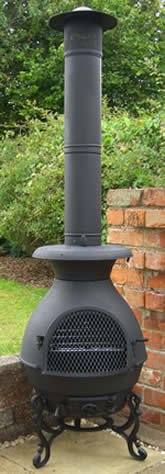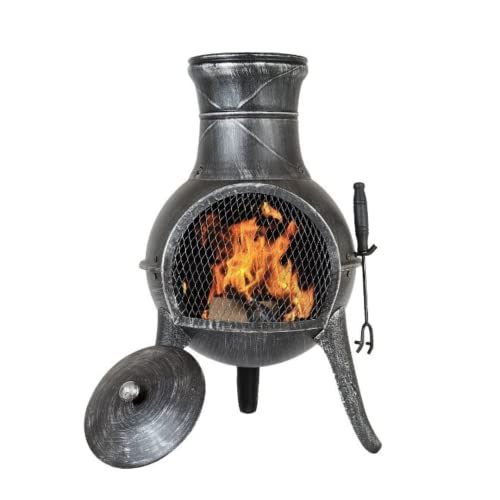10 Apps To Help You Manage Your Chiminea Fireplaces
페이지 정보

본문
 Chiminea Fireplaces
Chiminea Fireplaces Chimineas add a new dimension to backyard fireplaces. Fire pits can be excellent, but they are not as versatile as chimineas. These unique outdoor fireplaces are works of art that provide both ambience and heat for your family gatherings.
Chimineas add a new dimension to backyard fireplaces. Fire pits can be excellent, but they are not as versatile as chimineas. These unique outdoor fireplaces are works of art that provide both ambience and heat for your family gatherings.Chimineas must be kept in a safe place and should not be placed directly beneath any material that could ignite. They should also be protected from rainy weather.
Safety
Whatever fire feature you choose for your backyard, it's essential to be aware of safety precautions. Both Chimineas And Fire Pits (Ask.Mgbg7B3Bdcu.Net) are prone to generating hot sparks, which could cause burns. They also release smoke which could be contaminated such as secondhand tobacco smoke. Be sure that the area is free of anything that could ignite and that the chiminea is placed away from trees that are overhanging or eaves that could catch fire. Wear protective clothing whenever you are using a Chiminea. This is especially crucial if you plan to cook food with it.
Both chimineas, as well as fire pits can provide warmth, entertainment, and a focal point to your outdoor space. However they differ in terms of aesthetics and requirements for living. Fire pits are more dramatic and can be utilized to complement a broad variety of design styles. Chimineas provide a more traditional, rustic appearance and are perfect for smaller gardens. They also require a bit more maintenance, as they tend to create more smoke than fire pits, and require regular ash cleanup.
In terms of environmental impact, chimineas produce less pollutants as particulate matter than traditional wood-burning fire pits because they burn smoky, dryer, and better-seasoned wood that results in less emission per usage. Both kinds of fire pits can release large quantities of air pollutants, mainly in the form toxic chemicals.
When constructing the chiminea, make sure to use only seasoned wood and to keep the burning flames to a minimum. A mesh-screen spark stopper can also be placed on top of your chimney. A spark arrester can reduce the amount of sparks generated, which can ignite grass fires and spread the fire to nearby combustible materials. It's a good idea not extinguish a chiminea using water since the sudden shift in temperature may damage clay, terracotta, or even metal.
Both chimineas and fire pits are best used on an unflammable surface, such as pavers brick, concrete or slate tiles. Ideally, the chiminea should be at least ten feet from any structure or combustible materials. It's a good idea purchase a hose and a water container for homeowners so they can quickly put out any fires that might occur.
Style
Chimineas are a favorite among homeowners, even though fire pits are becoming more popular. They're a great option to give a rustic or Mexican look to your garden or patio and can offer warmth in the cooler months. You should choose between a biggest chiminea or fire pit in relation to the size of your outdoor space and the type of fuel you'd like to use.
Chimineas come in a variety of styles, from the classic round terra-cotta clay design to contemporary metal designs. Some allow burning wood instead of gas, which is a great alternative to use when the weather turns cold or it is too windy to have a fire.
The base of a traditional chiminea is hollow and holds the firewood. The wood is fed from the front. The chimney neck is extended up to direct smoke away from your home and away from drafts. This helps to reduce soot and prevents it from getting into food items or on your body when you cook.
Chimineas made from clay and terra-cotta may cause damage if they are too hot, so they work best in spaces that are protected from the elements. Cast iron and steel chimineas can endure heat, but they are heavy and difficult to move around.
A chiminea that is wood-burning can be an excellent addition to your patio, especially when you have plenty of open space to set it up. Be aware that chimineas require plenty of space to smoke. They should be placed away from other structures or seating areas so as to avoid damage.
You can choose a chiminea that is made of clay or metal. It can be painted or look natural. If you select a metallic one is likely to come with a protective layer that can help keep rust at bay. Some models even have the black color for a contemporary look. You can also choose one with a genuine rust patina, which develops naturally when the metal is exposed to elements.
Fuel
Chimineas make the perfect centerpiece for patios with smaller dimensions. They feature a broad base that tapers off to an even narrower chimney. With a variety of materials and hand-crafted details These fireplaces enhance the look of any deck or backyard providing warmth and ambience to any outdoor living space.
Chimineas minimize unwanted emissions, unlike traditional wood-burning fire places, which can be hazardous to your health. Their enclosed design and upward-directed chimney helps reduce smoke, which can alleviate environmental issues and nuisances from neighbors. This is especially beneficial for those who live in an urban area where excess smoke can cause problems for neighbors.
Chimineas are typically made of treated or seasoned wood. However, there are models that can also be used with charcoal and propane gas for a more versatile cooking experience. If you choose to use fossil fuels such as coal, you'll have to keep an eye on your fuel to ensure it doesn't emit excessive smoke.
Similar to fire pits, chimineas vary in size, however there are designs that fit standard logs, and even larger pieces of wood that can be used for grilling purposes. Certain chimineas feature features like a grilling grate as well as a screen or rain cap to protect the chimney from falling sparks and debris. Some, like this model from Bali Outdoors, include a screened mouth opening and a wood poker made from steel for safely igniting the fuel.
If you're looking for an edgier or modern design, there's bound to be a chiminea to match your style. There are chimineas with engraving or painted details and traditional models. Certain manufacturers, like the Blue Rooster Company that makes our top choice, offer conversion kits that can transform chimineas that burn wood to gas-powered models.
A chiminea that is properly designed will provide an enjoyable and safe garden chiminea experience. Consider your space, aesthetic preferences, and lifestyle needs to determine which one is best suited to you. When you shop, ensure you prioritize safety features and maintenance requirements. Also, think about your budget to ensure that you can enjoy the chiminea throughout the year.
Maintenance
Although chimineas are incredibly simple to use, they require some attention to ensure their long life and safety. Keep your chiminea clean of dust and ash to prevent fire hazards and structural damage. Regular cleaning can also improve the appearance of your fireplace outside and adds rustic appeal.
Chimineas are typically wood-burning, gas models can easily be converted to burn natural or propane gas. When using a gas chiminea it is important to ensure that the chimney is free of any flammable material such as leaves and twigs to avoid carbon monoxide poisoning. It is also important to only burn dry well-seasoned wood in your gas chiminea because treated or painted materials release toxic chemicals when they are burned.
It is recommended to cover the clay chiminea's bottom with pea gravel or rock sand. This will keep the clay from cracking due to the heat produced by a large fire. It is also wise to place an aluminum or slate stack cover over the chiminea in order to protect it from rain. Chimineas are designed to be cured or broken slowly by creating small fires, and then expanding their size over time. After three or four small fires, you can use full-sized wood in your Chiminea.
It is crucial to be aware of local laws regarding burning when using your chiminea. Be especially cautious during drought conditions, since the constant smoke from a chiminea could cause neighbors to become angry or request you to take out your flames.
Chimineas made of clay and steel are both susceptible to cracking or breaking when the weather is too hot or too cold. However, steel structures will be more likely to rust and develop corrosion than those made of clay. A high-quality, long-lasting chiminea can ensure that your outdoor fireplace will last for many years to be.
When using your chiminea for the garden it is recommended that the grate is filled with about 3 inches of rock sand or pea gravel to stop the fire from spreading too fast and posing a fire risk. It is also a great idea to position your fireplace so that winds will blow the smoke away and not blow it into your home. The constant flow of toxic gases can cause problems.
- 이전글What's The Current Job Market For Chiminea Fireplaces Professionals Like? 24.12.20
- 다음글10 Great Books On Double Glazing Replacement Sealed Units 24.12.20
댓글목록
등록된 댓글이 없습니다.

